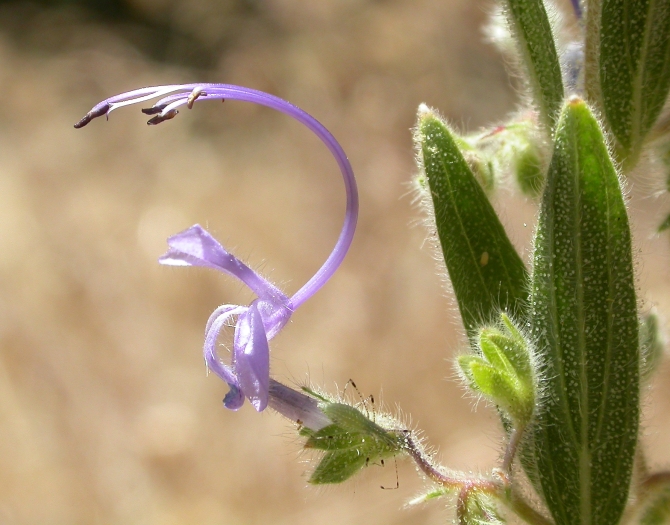Vinegarweed
(Trichostema lanceolatum)
Vinegarweed (Trichostema lanceolatum)
/
/

NPS
Public domain
Image By:
NPS
Recorded By:
Copyright:
Public domain
Copyright Notice:
Photo by: NPS | License Type: Public domain | License URL: https://creativecommons.org/public-domain/ | Uploader: Tillman | Publisher: Wikimedia Commons | Title: Trichostema_lanceolatum_NPS.jpg | Notes: User created page with UploadWizard |




















































Estimated Native Range
Summary
Trichostema lanceolatum, commonly known as Vinegarweed, is an annual herb that thrives in the native habitats of California chaparral and woodlands, coastal sage scrub, and the dry, open grasslands of Northwest Mexico. It typically grows to less than 1 meter (3.3 ft) in height and is known for its intense vinegar-like aroma, especially during hot weather, due to the release of volatile oils. The plant features distinctive bilaterally symmetrical flowers, ranging in color from pale blue to purple, which are arranged in elongated clusters along the leaf axils on short green stems. Vinegarweed’s flowering season spans from August to October, and the flowers are particularly showy, attracting attention when in bloom.
Vinegarweed is valued for its drought tolerance and the unique fragrance it emits on warm days, making it an interesting addition to xeriscapes and native plant gardens. It is also appreciated for its ecological role as a significant pollen source for native bees and other pollinating insects. This plant is well-suited for cultivation in areas with full sun exposure, requiring minimal water and preferring soils with slow drainage. While it reproduces solely by seed, dispersal is limited as seeds typically fall close to the parent plant. Gardeners should note that Vinegarweed may self-sow and spread within suitable conditions.CC BY-SA 4.0
Vinegarweed is valued for its drought tolerance and the unique fragrance it emits on warm days, making it an interesting addition to xeriscapes and native plant gardens. It is also appreciated for its ecological role as a significant pollen source for native bees and other pollinating insects. This plant is well-suited for cultivation in areas with full sun exposure, requiring minimal water and preferring soils with slow drainage. While it reproduces solely by seed, dispersal is limited as seeds typically fall close to the parent plant. Gardeners should note that Vinegarweed may self-sow and spread within suitable conditions.CC BY-SA 4.0
Plant Description
- Plant Type: Herb
- Height: 1.5-3 feet
- Width: 1-2 feet
- Growth Rate: Moderate
- Flower Color: Blue, Purple
- Flowering Season: Summer, Fall
- Leaf Retention:
Growth Requirements
- Sun: Full Sun
- Water: Low
- Drainage: Slow
Common Uses
Bee Garden, Bird Garden, Butterfly Garden, Deer Resistant, Drought Tolerant, Hummingbird Garden, Low Maintenance
Natural Habitat
Native to California chaparral and woodlands, coastal sage scrub, and the dry, open grasslands of Northwest Mexico
Other Names
Common Names: Vinegar-Weed, Camphor Weed
Scientific Names: , Trichostema lanceolatum,
GBIF Accepted Name: Trichostema lanceolatum Benth.